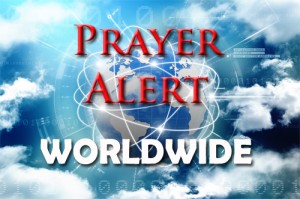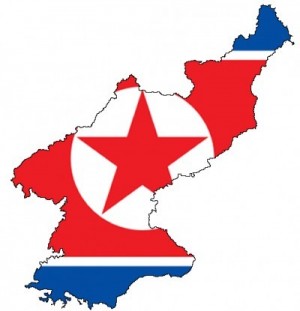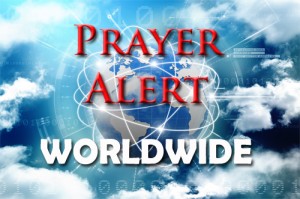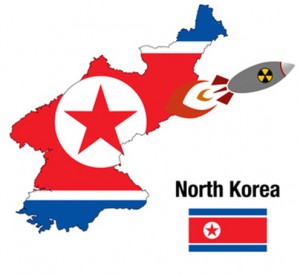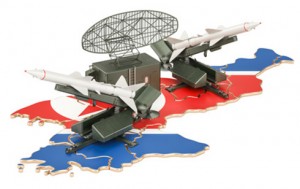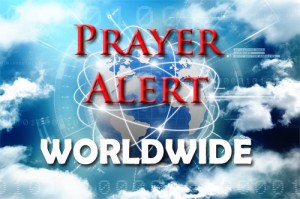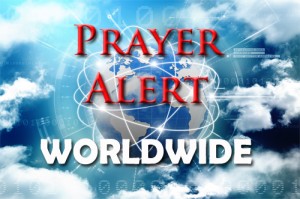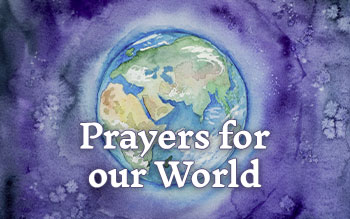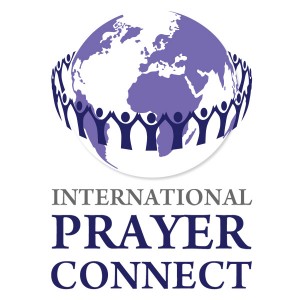Displaying items by tag: North Korea
North Korea: Olympic involvement, a trigger for prayer
The North Korean missile crisis must be turned into a rallying cry for prayer for persecuted Christians in that country, says Release International, which supports Christians under pressure around the world. North Korea brought forward its annual display of military might to 8 February ahead of the Winter Olympics in South Korea. The muscle-flexing has been described as grandstanding in a crisis that could threaten nuclear war - but many believe the crisis should be turned into a rallying cry for prayer for the persecuted. North Korea is probably the harshest persecutor of Christians on the face of the earth.
NORTH KOREA - Danger of War: Keep Praying
The situation on the Korean Penninsula remains critical.
We would highlight the following articles and encourage our prayer partners to continue to mobilise prayer across your networks, into this tense standoff.
North Korean leader: The launch button is on my desk - Israel National News - Kim Jong Un warns his country has developed the capability to hit the entire U.S. mainland with nuclear weapons.
Kim Jong Un orders up larger missile with re-entry ability:The Asahi Shimbun
Kim Jong-un is 'setting a trap for the US and South Korea' | Daily Mail Online
KIM JONG UN ARMING, TRAINING CHILDREN FOR WORLD WAR 3
'North Korea is very militarized, far beyond any imagination of western powers'
Russia Warns World Faces War Worse Than Any Other In Human History
215 Million Christians Persecuted, Mostly by Muslims
by Raymond Ibrahim January 21, 2018 at 5:00 am
https://www.gatestoneinstitute.org/11775/persecuted-christians-open-doors
In short, the overwhelming majority of persecution that these 215 million Christians experience around the world — especially the worst forms, such as rape and murder — occurs at the hands of Muslims.
If time is on the side of Christians living under Communist regimes, it is not on the side of Christians living under Islam. The center of the great Christian Byzantine Empire is now an increasingly intolerant, rapidly Islamizing Turkey. Carthage, once a bastion of Christianity — where one of Christendom's greatest theologians, St. Augustine, was born and where the New Testament canon was confirmed in 397 — is today 99% Muslim-majority Tunisia.
As what began in the seventh century comes closer to fruition and the entire world becomes more Islamic and "infidel" free, as in Iraq, confronting these uncomfortable facts is at least a welcome first step in countering the problem.
"215 million Christians experience high levels of persecution" around the world, according to Open Doors, a human rights organization. On its recently released World Watch List 2018, which ranks the world's 50 worst nations wherein to be Christian, 3,066 Christians were killed, 1,252 abducted, and 1,020 raped or sexually harassed on account of their faith; and 793 churches were attacked or destroyed.
The Islamic world had the lion's share of this persecution; 38 of the 50 worst nations are Muslim-majority. The report further cites "Islamic oppression" behind the "extreme persecution" that prevails in eight of the 10 worst nations. In short, the overwhelming majority of persecution that these 215 million Christians experience around the world — especially the worst forms, such as rape and murder — occurs at the hands of Muslims.
These Muslims come from all walks of life and reflect a variety of races, nationalities, languages, socio-economic and political circumstances. They include Muslims from among America's closest allies (Saudi Arabia #12 worst persecutor) and Muslims from its opponents (Iran #10); Muslims from rich nations (Qatar #27 and Kuwait #34) and Muslims from poor nations (Afghanistan #2, Somalia #3, and Yemen #9); Muslims from widely recognized "radical" nations (Pakistan #5), and Muslims from "moderate" nations (Malaysia #23 and Indonesia #38).
But if the World Watch List ranks North Korea — non-Islamic, communist — as the number one worst persecutor of Christians, why belabor the religious identity of Muslims? Surely North Korea's top spot suggests that Christian persecution is not intrinsic to the Islamic world but is rather a byproduct of repressive regimes and other socio-economic factors that proliferate throughout the Muslim world?
There are some important distinctions that need to be made. While Christians are indeed experiencing a "life of hell" in North Korea, overthrowing Kim Jong-un's regime could not only lead to a quick halt to this persecution but also to a rise of Christianity — as has happened recently in Russia. Under the Soviet Union, between 12 and 25 million Christians were killed for their faith[1], and approximately 153,000 churches were shut down.[2] Since the fall of the Soviet Union in 1991, about a thousand churches have been (re)built every year, and, according to a 2014 Pew report, between 1991 and 2008, Russians identifying themselves as Orthodox Christian rose from 31% to 72%. That "South Korea is so distinctively Christian" reflects what could be in store — and creating fear for — its northern counterpart.
In the Islamic world, the fall of dictatorial regimes rarely seems to alleviate the sufferings of Christians. On the contrary, when secular dictators fall — Saddam in Iraq, Qaddafi in Libya, and attempts against Assad in Syria — persecution of Christian seems to rise as a grassroots byproduct. Today, Iraq is the eighth worst nation in the world in which to be Christian, Syria is fifteenth, and Libya seventh. Under dictators, these countries were significantly safer for religious minorities.
A militiaman from the Nineveh Plain Protection Units (NPU) walks through a destroyed church on November 8, 2016 in Qaraqosh, Iraq. The NPU is a militia made up of Assyrian Christians that was formed in late 2014 to defend against ISIS. Qaraqosh is a mostly Assyrian city near of Mosul that was captured by ISIS in August 2014, and liberated in November 2016. (Photo by Chris McGrath/Getty Images)
Similarly, the only countries that were part of the former Soviet Union that still persecute Christians are, rather tellingly, the Muslim-majority ones of Central Asia. These include Uzbekistan (#16 worst persecutor), Turkmenistan (#19), Tajikistan (#22), Kazakhstan (#28) and Azerbaijan (#45).[3]
The "extreme persecution" of Christians throughout the Muslim world is part of a continuum begun nearly fourteen hundred years ago. The same patterns of persecution are still prevalent — including attacks for blasphemy and apostasy, restrictions and attacks on churches, and a general contempt for — followed by the vile treatment of — "subhuman infidels."
Unlike the persecution of Christians in Communist nations, rooted to a particular regime, Muslim persecution of Christians is perennial, existential, and far transcends any ruler or regime. It unfortunately seems part and parcel of the history, doctrines, and socio-political makeup of Islam — hence its tenacity and ubiquity. It is a "tradition."
That those persecuting Christians come from a wide variety of racial, linguistic, cultural, and socio-economic backgrounds — from African, Arab, Asian, and Caucasian nations — and share little in common with one another, except for Islam, sadly only further underscores the true source of the persecution.
If time is on the side of Christians living under Communist regimes, it is not on the side of Christians living under Islam. The center of the great Christian Byzantine Empire is now an increasingly intolerant, Islamizing Turkey. Carthage, once a bastion of Christianity — where one of Christendom's greatest theologians, St. Augustine, was born and where the New Testament canon was confirmed in 397 — is today 99% Muslim-majority Tunisia. Centuries of persecution and forcing non-Muslims to live as barely-tolerated third-class residents are responsible for the demographic shift that Tunisia and other formerly non-Muslim nations are experiencing.
Long after North Korea's Kim Jong-un has gone, tens of millions of Christians and other "infidels" will still suffer persecution. As what began in the seventh century comes closer to fruition and the entire world becomes more Islamic and "infidel" free, as in Iraq, confronting these uncomfortable facts is at least a welcome first step in countering the problem.
Raymond Ibrahim is the author of Crucified Again: Exposing Islam's New War on Christians (published by Regnery with Gatestone Institute, April 2013).
[1] James M. Nelson, Psychology, Religion, and Spirituality, 2009, p. 427.
[2] Paul Froese, "Forced Secularization in Soviet Russia: Why an Atheistic Monopoly Failed," Journal for the Scientific Study of Religion, Volume 43, Number 1, March 2004, p. 42
[3] While Open Doors ascribes the persecution of Christians in these five nations to "Dictatorial Paranoia," considering that they are all overwhelmingly Muslim majority, it seems reasonable to conclude that Islam is at least partially responsible. Open Doors itself notes that "There is a grassroots revival of Islam in Central Asia, and that means more pressure from the nationalist pro-Islamic governments and within society—causing increased persecution levels on two fronts."
The 50 worst places on Earth for Christians
'They will just execute somebody who commits their life to faith'
http://www.wnd.com/2018/01/the-50-worst-places-on-earth-for-christians/
215,000,000 Christians Persecuted, Mostly by Muslims
https://www.gatestoneinstitute.org/11775/persecuted-christians-open-doors
North Korea: Christian survival
Every aspect of North Korean life is controlled by the state, which believes that there is no higher authority than Kim Jong-un. Christianity threatens this belief and must be crushed. Tens of thousands of Christians are imprisoned in labour camps, yet the church is growing. There are 300,000 courageous believers, many not even telling their children, who live under constant surveillance by authorities looking for anything that might threaten the regime. There are even rewards of a new home or better job for anyone who helps discover Christians. Every citizen must report to a ‘neighbourhood watch’ system any absence from home, or a neighbour neglecting to clean the portrait of Kim which everyone must have on their walls.
North Korea 'devastating' EMP Threat
Only a few weeks after a team of experts warned Congress that the nation faces an “existential threat” from North Korea from a possible electromagnetic pulse attack, a new report says the rogue nation is mapping a specific plan.
Paul Bedard at the Washington Examiner wrote in his “Washington Secrets” column that the White House “is being warned that North Korea is mapping plans for a ‘devastating’ attack on the United States with an atmospheric nuclear explosion that would disable the nation’s electric grid, potentially leading to the deaths of virtually all impacted.”
He said President Trump “is being urged to create a special commission to tackle the potential for an electromagnetic pulse attack, one similar to the iconic Manhattan Project.”
Bedard cited Marine Corps veteran Tommy Waller, an advocate for an EMP commission, now the director of special projects at the Center for Security Policy.
“The first and foremost thing he must write is an executive order establishing his own EMP commission in the White House – a task force that draws from the experience of the previous EMP Commission,” Waller wrote.
Waller said that after “massive intelligence failures grossly underestimating North Korea’s long-range missile capabilities, number of nuclear weapons, warhead miniaturization, and proximity to an H-Bomb, the biggest North Korean threat to the U.S. remains unacknowledged – nuclear EMP attack.”
“North Korea confirmed the EMP Commission’s assessment by testing an H-Bomb that could make a devastating EMP attack, and in its official public statement: ‘The H-Bomb, the explosive power of which is adjustable from tens of kilotons to hundreds of kilotons, is a multi-functional thermonuclear weapon with great destructive power which can be detonated even at high altitudes for super-powerful EMP attack according to strategic goals.'”
One of those experts who delivered the warning to Congress, Peter Pry, told WND it is the deep state, entrenched bureaucrats whose loyalties likely lay with a previous administration, that is indifferent to a threat that testimony has confirmed could kill 90 percent of the people in the affected region within a year.
Get the real story about EMP in the ground-breaking “A Nation Forsaken” by F. Michael Maloof, as well as “Lights On” by Jeffrey Yago, from the WND Superstore.
Pry, a nuclear strategist formerly with the CIA who served as chief of staff of the Congressional EMP Commission until it was terminated in September (the same month North Korea tested a hydrogen bomb, which it described as capable of a super powerful EMP attack), said liberal Democrats still are running a lot of Washington even after President Trump’s election.
“The people who sabotaged the EMP Commission, Obama holdovers, are still at the Department of Defense. They have not been replaced by the Trump administration. This is happening not just with the vitally important EMP Commission,” he said. “Our society, the Trump administration and the people who voted for Trump are paying for the failure of Congress to support Trump appointees quickly.
“At the same time during the Obama administration, he had twice as many appointees appointed to positions in government than Trump has. It’s not President Trump’s fault – these people are undermining and opposing the policies that President Trump has enacted, including the case of the EMP Commission.”
Pry explained Obama administration bureaucrats, who believed Hillary Clinton would win the 2016 presidential election, did everything they could to sabotage and undermine the commission.
“They held back money for a whole year. They held back security clearances. They tried to stop the commission’s staff from working, arguing that ‘you need a contract in order to work for the EMP Commission.’ They wouldn’t even let me work, or other staff, pro-bono. We did anyway.
“Had Hillary won, we would never have received any of our funding or security clearances. It was all after she clearly lost and Congress intervened that they relented at the last minute. A commission that was supposed to have been able to work 18 months at EMP ended up with resources and support from the Department of Defense that enabled us to put in six months of work. That’s no way to provide for the national security of the country against an existential threat like EMP.”
An EMP comes from a nuclear explosion at altitude over the United States. The blast would disrupt electronics in line of sight, including those computer and other systems that deliver food, fuel, energy and communications to Americans.
Further, repairing or replacing those systems easily could take months, or even longer.
The result would be a run on food currently in stores, and starvation when those supplies failed, as replacements would be impossible without those delivery systems.
Pry detailed how an EMP attack would be more devastating than an asteroid hitting.
“We have a population of 320 million Americans today – we are only able to sustain that population because of our technology. Our modern technological economy and all of our critical infrastructure that support that economy is keeping 320 million Americans alive,” he explained. “Communication, transportation, business and finance, our industrial capability, even food and water depend on electricity. When you subtract electricity, when you cause a nationwide blackout, blackout the electric grid and all the life-sustaining critical infrastructures, how can you now support 320 million people? How many people can you support?”
Pry said many downplay the threat of an EMP attack by claiming the conditions resulting from the attack would be similar to “time traveling” to a time when people were less dependent on electricity. But in reality, he warned, the “aftermath of an EMP would be an unprecedented environmental catastrophe.”
There would be a ripple effect to the problem, too.
“Gas line pipes are going to blow up – you’ll have firestorms in cities from exploding gas pipelines. Chemical spills, toxic clouds industrial accidents, where fires break out because of the failure of safety … systems,” he said. “This huge chemistry set that is our society isn’t just going to sit there and black out; in many cases, it’s going to detonate and basically turn into bombs. In seven days, the nuclear reactors will go Fukushima and spread radioactivity everywhere.”
Jeffrey Yago, a licensed engineer and certified energy professional, says the danger of an EMP attack is very real.
“I think in the future of this country, we’re going to certainly see not only more power outages in more areas, but they’re going to last a lot longer,” Yago said during an interview on The Hagmann Report. “I’m not talking about a two-day outage [caused] by a storm or a weeklong outage by something like Hurricane Sandy or Katrina, but we’re talking potentially, these problems could impact major parts of the United States for months, not days.”
Yago believes if America continues on its current path of escalating tensions with North Korea, an EMP attack will be imminent. He suspects China, North Korea’s biggest ally, would rather see North Korea attack the U.S. with an EMP weapon than with a more conventional nuclear missile. A nuclear missile would destroy buildings and other infrastructure that China, the U.S.’s largest foreign creditor, may hope to own one day. An EMP attack would destroy America’s electrical grid while leaving other critical infrastructure intact.
Plenty of experts in the public and private sectors are aware of the EMP threat to America’s power grid. Multiple studies have been published, including “Securing the U.S. Electrical Grid” by the Center for the Study of the Presidency and Congress in 2014, “Electric Grid Vulnerability” by the staff of two Democratic congressmen in 2013, and “Large Power Transformers and the U.S. Electric Grid” by the U.S. Department of Energy in 2012.
Get the real story about EMP in the ground-breaking “A Nation Forsaken” by F. Michael Maloof, as well as “Lights On” by Jeffrey Yago, from the WND Superstore.
North Korea Further Briefing (Dec 2017)
I trust you have been following the news about the current threat from North Korea that could impact both Asia and North America, especially if Kim Jong Un, fires another ICBM and accidentally hits Japan or South Korea, prompting retaliation and war, or shoots a nuke a couple hundred miles above North America in what is called an EMP or electro-magnetic pulse attack that could knock out power grids and put the lives of millions in the continent at stake.
Please see the article below and pray for a wall of protection around the countries of Asia and North America. The Psalmist reminds us over and over that the Lord is the one who protects our nations. He is our only security in the final analysis. He is our "strength and shield", "a fortress of salvation" and hears our cry for mercy (28:6-8) so let's pray accordingly in this tense time.
I was in Washington DC last week and met with one of the USA's national security people who is an expert on North Korea also a woman of prayer. She said the crisis is likely to get "more intense" and that we should pray there will be no miscalculation on either side. Let's please therefore pray that God would give wisdom and restraint to all the political leaders involved whether in North and South Korea, Japan, China, Russia and the USA.
During a national prayer call that focused on the Korean situation last night, I quoted a theologian who penned those famous words: "History belongs to the intercessors who believe the future into being." Let's trust God together and believe for a peaceful solution to this grave situation.
Please watch and pray over the news from the Korean peninsula. This is the most threatening and dangerous situation the world faces right now and it looks to be worsening.
Pray: that the North Koreans will back down from their provocative actions.
Pray: that Kim Jong Un will either change course or be removed by his own government or by Chinese intervention.
Pray: that a military confrontation that could take the lives of hundreds of thousands or even millions would be averted.
Pray: ask that God would give special wisdom and restraint to President Trump, President Xi Jinping of China, President Moon Jae-in of South Korea as well as all other leaders involved in the current crisis that a peaceful solution can be found to ending North Korea's nuclear threats and weapons program.
Please refer to our previous articles on the IPC Prayer Website: http://www.ipcprayer.org/ipc-connections/item/9956-praying-for-north-korea-nov-2017.html
John D RobbChairman
IPC Prayer Connect
Sarah Lee writes: The situation is more precarious than ever. In fact, the crisis we are seeing is one that is unprecedented. The present South Korean government is pushing ahead with near-communist policies at full-throttle. In the midst of the threats being hurled from North Korea, such governmental steering has enraged some people, confused others, and brainwashed even others with false ideologies.
The threats from North Korea saying that it will make Seoul a sea of fire is being ratcheted up even more, and this has greatly contributed to the rapid fraying of a near 70 year old alliance between South Korea and the U.S. Many analysts and experts see this fraying as the first step toward the communization of all of Korea.
Pray: that the tides would turn and that the South Korea-U.S. alliance would be reinforced.
Pray: That the destiny of this alliance — and this nation — cannot be left to the hands of the sympathizers of the North Korean regime.
We are feeling with every cell in our bodies that the only hope for this nation is in Christ alone. We are seeing a new fire being ignited in the prayers of the Korean Church. New prayer gatherings with new strength are rising up throughout the nation. For this, we praise the Lord!
I am thankful that we are able to join in the midst of prayers being lifted up to the Lord in our respective places.
Thank you again, for your prayers in such a critical time.
In His hope and faithfulness,
Sarah
Zimbabwe: Celebrations - then what?
On the 22nd November, when President Mugabe resigned, celebrations on the streets resembled scenes inside a stadium after a soccer world cup victory. Like many Sub Saharan Africa countries, Zimbabwe’s population is young, 60% of the population is under 25 and 70% have known no other president. His successor Mr Mnangagwa, when minister for national security, was notorious for overseeing the the brutal 1983 campaign against supporters of Mugabe rival Joshua Nkomo. It became known as ‘Matabeleland massacres’. Between 10,000 and 20,000 Ndebele people died during the civil conflict, which involved the Zimbabwean Fifth Brigade, equipped and trained by North Korea. Mnangagwa is rumoured to have amassed a sizeable fortune, been involved in developing Harare diamond trading and was targeted by US sanctions early 2000, for undermining democratic development in Zimbabwe. He was also investigated by the UN for exploitation of mineral resources in Congo. Pray that his succession is not a continuation of the corrupt status quo.
Asia: Trump’s tour
Escaping scandal in Washington after indictments of his campaign associates, President Trump is on a 13-day tour through five Asian capitals. Trump’s first stop was Japan, where the priorities were a Japan-US military alliance and trade. While visiting South Korea, China, Vietnam, and the Philippines, he hopes to encourage other regional powers to step up their efforts to pressurise North Korea into abandoning its nuclear and ballistic missile programmes. The continent is gripped with tension over the nuclear standoff on its eastern edge. Trump told South Korean lawmakers that Kim Jong-un would face disaster if he continued to lead his nation down the dark path towards nuclear weapons. ‘Do not underestimate us. Do not try us’ was a direct warning to Pyongyang. Trump is trying to persuade Chinese leaders to put even more pressure on North Korea. At the Asia-Pacific Economic Cooperation summit in Vietnam (9 to 10 November), he hopes to enlist President Putin’s help in changing North Korea's behaviour. See next article.
99. NSFA Update #51
NATIONAL SECURITY FOREIGN AFFAIRS UPDATE
OCTOBER 23, 2017 (REPORT #51)
Highlights:
- Cold War returns with nuclear-armed bombers on 24-hour alert
- CIA expands Taliban hunt
- ISIS battle converges in the Euphrates Valley
- Iraqi, Kurdish forces exchange fire at shared border
- U.S. Forces Korea ready with THAAD
- Russia complains U.S.-led coalition destroyed Raqqa like allies did the German city of Dresden in World War Two
- U.S. SEC State calls on Iran-backed militia to go home
- Iraq’s PM rejects Tillerson’s call for PMU to “go home”
CURRENT
- Cold War Returns with Nuclear-Armed Bombers on 24-hour alert. DefenseOne reports the U.S. Air Force is preparing to put nuclear-armed bombers on 24-hour ready alert, something not seen since the end of the Cold War. “This is yet one more step in ensuring that we’re prepared,” Gen. David Goldfein, Air Force chief of staff, said. “I look at it more as not planning for any specific event, but more for the reality of the global situation we find ourselves in and how we ensure we’re prepared going forward.” Putting the bomber fleet on alert is just one of many decisions facing the Air Force as the U.S. military responds to changing geopolitical environment that includes North Korea’s rapidly advancing nuclear arsenal as well as Russia’s increasingly potent and active armed forces.
- CIA expands Taliban hunt. The New York Times reports the CIA is expanding its operations in Afghanistan, sending teams alongside Afghan forces to hunt Taliban jihadi. The Times reports this is a shift for the CIA in that country, where it had focused on defeating al Qaeda and helping Afghan intelligence operatives. The agency’s paramilitary division, which is taking on the mission, numbers only in the hundreds and is deployed all over the world. The expanded mission reflects that agency’s assertive role under Mike Pompeo, the new director, to combat insurgents around the world. Pompeo said “We can’t perform our mission if we’re not aggressive. … This is unforgiving, relentless. You pick the word. Every minute, we have to be focused on crushing our enemies.”
- ISIS battle converges in the Euphrates Valley. The Air Force Times reports the coalition’s fight with ISIS jihadi is now focused along a stretch of the Euphrates River Valley straddling the Syrian border. ISIS no longer has a presence in cities such as Mosul, Tal Afar and Haditha. Rather, U.S.-led coalition forces are focused on driving ISIS out of towns like al Qaim. Air operations are “shaping” the battlefield by taking out weapons centers like car bomb factories and ISIS C3 centers. Brig. Gen. Andrew Croft, deputy commanding general for Air, Combined Joint Forces Land Component Command, Operation Inherent Resolve, said “They’ll move against multiple areas in the Euphrates River Valley in a multi-axis operation. The preponderance of ISIS forces, we believe, are in that area … essentially all the way out east to Rawa.”
CONSEQUENCES
- Iraqi, Kurdish forces exchange fire at shared border. The Military Times reports Iraqi federal and Kurdish forces exchanged fire at their shared border on Friday, ending a week of conflict whereby Kurds returned control to Iraqi forces. By mid-Friday, Iraq’s defense ministry said anti-terrorism forces used artillery against Kurdish forces in AltunKupri, a town in the Kurdish region. Kurdish forces withdrew last week in most areas to positions they last held in 2014, restoring the map to the time before the rise of ISIS.
- U.S. Forces Korea ready with THAAD. The Yonhap News Agency reports the U.S. Forces Korea set-up the unit charged with operating the advanced missile defense system deployed in that country. On Thursday, a ceremony was held in Seongju to transfer the Delta Battery of the 11th Air Defense Artillery brigade to the 35th ADA Brigade in South Korea. The Terminal High Altitude Area Defense (THAAD) battery, which has missile launchers, command and control facilities and a powerful radar, was first deployed in April, but at that time there were only two interceptor launchers. Four more launchers arrived last month.
- Russia complains U.S.-led coalition destroyed Raqqa like allies did the German city of Dresden in World War Two. The BBC reports the Syrian Democratic Forces, a U.S.-backed alliance of Kurds and Arabs, destroyed Raqqa, and Moscow compared that result to the Allied destruction of the German city of Dresden in WW II. Russia itself was accused of committing war crimes for bombarding Aleppo, Syria last year. UN war crimes investigators in June that there had been a “staggering loss of civilian life” in Raqqa. A Russian defense spokesman said “Raqqa has inherited the fate of Dresden in 1945, wiped off the face of the earth by Anglo-American bombardments.”
- U.S. SEC State calls on Iran-backed militia to go home. The BBC reports U.S. Secretary of State Rex Tillerson called on Iran-backed militias fighting ISIS should leave northern Iraq as the battle is nearing its end. Tillerson insists mopping up should be left to the Iraqis. Iraqi forces have been fighting ISIS alongside Popular Mobilization Units, a coalition of Shia militia, backed by Iran. Those units have been accused of abuses, including torture and killings, during the anti-ISIS operations in Iraq.
- Iraq’s PM rejects Tillerson’s call for PMU to “go home.”The media office of Iraqi Prime Minister Haider al-Abadi on Oct. 23 criticized U.S. Secretary of State Rex Tillerson's recent statements that Iranian-backed Popular Mobilization Units who helped Iraq fight the Islamic State should "go home," Reuters reported. According to Reuters, the prime minister's office said that "No party has the right to interfere in Iraqi matters."
Pray – lets be in prayer over each of these very significant situations and pray as we are guided.
Robert Maginnis
This email address is being protected from spambots. You need JavaScript enabled to view it.
Praying for North Korea (Nov 2017)
No weapon forged against you will prevail, and you will refute every tongue that accuses you. This is the heritage of the servants of the Lord, and this is their vindication from me,” declares the Lord. Is 54:17
In this edition of IPC Connections, we are once again highlighting the extremely volatile situation on the Korean Peninsula, that needs our prayers.
Last month, we prayed about the potential of military options, which could cause many deaths. There is still the danger of provocative actions which we continue to pray against. We also highlighted the significant relationship with China, who has the power and influence to broker a peaceful resolution to the crisis.
Since then, an interview (reported here) with an academic with close relations to the Chinese government has warned that a war between China and North Korea was 'on the table'. Chong Sho-Hu, a professor from Renmin University, Beijing said that the relationship with North Korea was now worse than it had been with both the Soviet Union and Vietnam at the time of the wars with those countries in the past.
In his words: "North Korea is standing on the edge of a deep cliff, one light blow could push this country off the cliff." When asked whether this meant one more missile test could trigger war, the professor agreed.
Let's pray for continued peace and a 'breakthrough intervention' in the relationship between China and North Korea that will open the door for a U-turn and for positive de-nuclearization negotiations.
We also report in this edition on the real threat that the continued development of intercontinental ballistic rockets by North Korea's regime is creating. North Korea’s deputy U.N. ambassador called his country’s nuclear and missile arsenal “a precious strategic asset that cannot be reversed or bartered for anything.” A UK Daily Mail article also included in this month's edition quotes North Korean official's ambitions - both defensive and offensive capability that will hold the whole of the United States within it's range.
As I have been writing this, a notification has arrived of an un-confirmed tunnel collapse in September at the North Korean nuclear test site that resulted in 200 deaths of 100 workers and a further 100 rescuers who were killed in a second collapse. Whilst any loss of life is regrettable, there is no doubt that such an incident will have hampered the efforts of the regime in their attempts to develop these nuclear weapons. http://www.reuters.com/article/us-northkorea-missiles-tunnel/tunnel-collapse-may-have-killed-200-after-north-korea-nuclear-test-japanese-broadcaster-idUSKBN1D018L?il=0
Pray on for the nuclear ambitions of North Korea to be thwarted. (Is 54:17) Let's also pray into the Treaty on the Prohibition of Nuclear Weapons and other United Nations efforts to restrict and reduce the development of nuclear arsenals globally.
Many Christians are suffering in North Korea for their faith. Choi Kwanghyuk (55) escaped a work camp where he was sent after being targeted and persecuted by the government for his Christian faith. Read about his harrowing experiences below.
Robert Park, a US prisoner of the Kim Jong-il regime from December 2009 to February 2010 estimates that there are up to 400,000 believers worshipping secretly in North Korea. He reminds us of the fact that thousands of the imprisoned Christians are in prison camps that are located close to military targets such as weapons facilities and test sites. Read Robert's moving plea for a workable and peaceable solution addressed to the Korean President below.
Pray on for those being persecuted, raped, beaten, tortured for their faith. (Matt 5:11-12). Pray for their release and an end to the oppression of believers of all faiths. Pray for a solution to the crisis that does not endanger lives, either side of the border.
On a more positive note, let’s be thankful for news of a growing Christian Church in North Korea, reported in this month's edition and for the innovative means being used to make the word of God available to them, through 'Bible Balloons containing text from the Bible or flash drives containing the whole Bible - Praise God!
Pray for the continuing efforts to encourage, equip and educate new believers in North Korea and for those who are taking great risks both in these efforts from South Korea and those who are nurturing God's people within North Korea. Pray for one, united Korea.
May God bless and encourage you all as you join us in praying both for Korea and these other important global matters.
In His service,
John Robb, IPC Chairman
